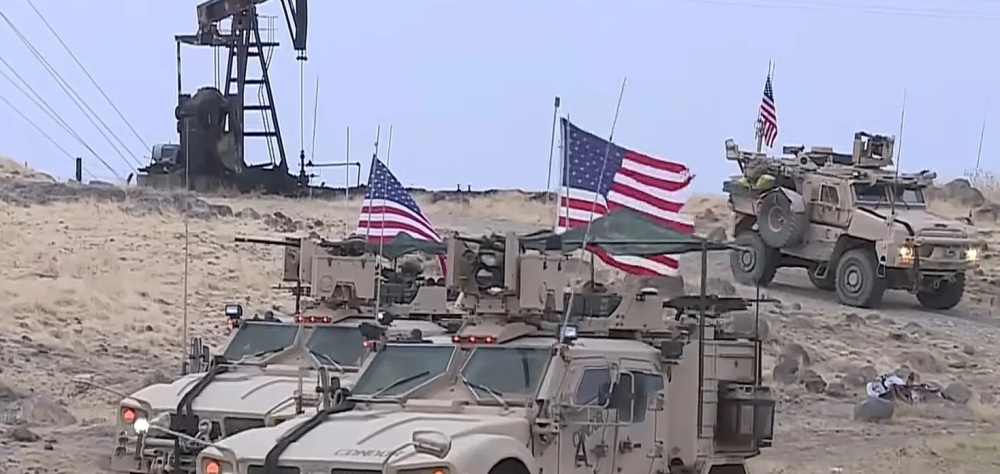Alwaght- In recent days, Turkish drones struck targets in northern Iraq at least twice, stirring reactions from local and central Iraqi government officials. Media outlets suggested that the strikes followed visit of commander of the predominantly-Kurdish militia Syrian Democratic Forces (SDF) Mazloum Abdi to Sulaymaniyah city of Iraqi Kurdistan region for meetings with American officials in the US military bases in the north.
There have not been details on the goals of Abdi’s visit to northern Iraq, nor have information about the topics of discussion with the Americans emerged on media. However, General Myles Caggins, the former spokesman to the so-called US-led Western anti-terror coalition in Syria and Iraq and now a senior member of New Lines Institute for Strategy and Policy, said that the Kurdish militia commander’s presence in Sulaymaniyah was not a surprise because this was not his first time in Iraq’s north. According to the American general, a few weeks ago, Bafel Talabani, one of the leaders of the Patriotic Union of Kurdistan (PUK) and the commander of the anti-terrorism group of this party, together with a two-star American general and one of the Western coalition commanders, visited Syria’s Hasakah to meet with the SDF commander.
The Turkish airstrikes came days after Ankara closed its airspace to flights to and from Sulaymaniyah airport, citing a possible increase in militant activity that threatened flight safety.
American troublesome presence posing challenge to Turkey, Syria, Iraq, and now Kurds.
Regardless of the reasons and degree of success of the Turkish airstrikes, the very military action indicates that Turkish fighter jets and drones have constant presence in the Iraqi skies. The intermittent airstrikes on areas in northern Iraq and even establishment of multiple military bases by the Turkish army deep within Iraqi borders have always drawn protests from Baghdad and some Kurdish leaders who argue these actions violate the Iraqi territorial integrity and national sovereignty. They even filed complaints at international organizations against Ankara.
After the drone attack around Sulaymaniyah airport, the Iraqi authorities reacted once again, and President Abdul Latif Rashid called the Friday attack “a clear violation of Iraq and its sovereignty” and asked Turkey to issue an official apology. He said that Ankara should not continue to kill Iraqis.
While Iraq’s protests have so far gone nowhere, by continuing its strikes, Turkey intents to send a warning message to the US and Iraqi Kurds about backing Syrian Kurdish militias, blacklisted as terrorist factions as they were regarded affiliates of the PKK terrorist organization which itself is designated a terrorist entity by Turkey, EU, and the US. Turkey has always considered US military cooperation with Syrian Kurdish militias as a threat to its national security and geopolitical interests and called on Washington to cut off communications and support from the SDF.
From another aspect, this situation shows that the US military presence in northern Syria and Iraq and ongoing backing to the Syrian Kurds in these regions grant Turkey an excuse and authorization to violate Iraqi and Syrian sovereignty with its military actions. Therefore, now Iraq and Syria governments and local people pay the price for the American military activities on their soil as they find their security and sovereignty compromised by the Americans.
Meanwhile, the recent Turkish attacks have even aggravated the political division between Erbil and Sulaymaniyah and the verbal conflict between the officials of the two main parties, namely the PUK and the Kurdistan Democratic Party (KDP). A statement issued by the local government of the northern Iraqi region on Friday blamed Sulaymaniyah local authorities and accused them of provoking Turkish attack on the airport and using state institutions for “illegal activities”.
On the other side, Qubad Talabani, the deputy prime minister of Kurdistan Regional Government (KRG) and one of PUK leaders, in a statement rejected Erbil claims, saying that the statement was “only a party viewpoint” and could not represent the whole government position.
Barzani-controlled KDP has always had friendly and relatively tensionless ties with Ankara and thus deems activities of PKK militias in marked contrast to Erbil and Iraqi Kurds’ interests. Even sometimes, PKK accused the party of intelligence and military collaboration with Turkey to facilitate attacks on its positions in Syria and Iraq. KDP, on the other side, accuses the PKK of inciting popular protests against the Barzanis’ rule over Kurdistan region.
Pressure of Turkish attacks on the US
Though Turkish attacks do not pose direct threats to the American bases and facilities, the US failure to prevent them will fuel Kurdish distrust in the US security and military supports in the future. Washington not only is not interested in consuming its geopolitical assets for militarily countering Turkey, but also the waves of attacks on the American bases in northern Syria in recent months demonstrate that the US cannot even guarantee security of its own bases and forces in northern Syria and Iraq.
Meanwhile, in addition to the American troublesome military presence, plundering of northern Syria energy sources with support from the American troops and their transfer to Iraq have further discredited the claims of military deployment to the two Arab countries for anti-ISIS goals. In the latest American forces’ activities in Syria and Iraq, Syrian Arab News Agency (SANA) on Tuesday, citing local sources in Al-Ya’arabiya town of Syria, reported that an American convoy consisting 77 armored vehicles and 32 oil tankers carrying stolen Syrian oil crossed the illegal Al-Walid Border Crossing to their bases in Iraq. Ex-president Donald Trump had talked about the necessity of the US dominance over northern Syrian oil sources. He obviously contradicted his aides, saying that troops in Syria were “only for oil.”
Certainly, what is clear is that as long as there are no checks on the suspicious and nighttime movement of American armored vehicles between Syria and Iraq, neither Syria can control its oil sources nor Iraq’s airspace will see calm.



























